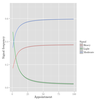Healthcare modelling

Operational Research (OR) has existed as a scientific discipline for over 70 years and has been applied to healthcare for over 50 years. The UK OR Society and the National Health Service (NHS) held a joint Colloquium on hospital appointment systems back in 1962. Since then OR models have been widely and successfully used to assist clinical decision-making, facility planning, resource allocation, evaluation of treatments, and organisational redesign. One of the most commonly used approaches is computer simulation, widely regarded as the technique of choice in healthcare because of its power and flexibility as well as its ability to function at a range of scales from the individual patient up to whole-system models.
Since its inception OR has been a discipline focused on solving real-world problems. Addressing the problems of real hospitals and real patients is paramount. Modellers need to develop new approaches to tackle the tough cultural problems inherent in healthcare systems. Multi-disciplinary working is "de rigeur" - Operational Researchers need to work alongside clinicians and healthcare managers as well as other disciplines such as health services research and health economics in order to exploit the synergies between them.
Healthcare modelling is an endlessly fascinating and challenging area in which to work. It is hard to imagine a more complex organisation than the NHS (the largest employer in Europe and the third largest worldwide, allegedly only exceeded by the Indian Railways and the Chinese Army!). OR models have been used at a patient or population level for modelling epidemics and disease progression, as well as at the micro-level for physiological processes and pharmacodynamics, for example. There are countless research challenges: developing models acceptable to all users, balancing user-friendliness with scientific rigour and validity, capturing human behaviour, understanding the complex links between humans and systems, not to mention all the clinical aspects. New PhD students are always welcome, from any numerate background!
For queries about this topic, contact Sally Brailsford.
View the calendar of events relating to this topic.
Projects

Bayesian Agents as Models for the Disclosure Behaviour of Pregnant Drinkers
Seth Bullock, Jakub Bijak (Investigators), Jonathan Gray
Examining the feasibility of signalling games, played by Bayesian decision theoretic agents as a model for the disclosure of drinking behaviour by pregnant women to their midwives.

Care Life Cycle
Seth Bullock, Sally Brailsford, Jason Noble, Jakub Bijak (Investigators), Elisabeth zu-Erbach-Schoenberg, Jason Hilton, Jonathan Gray
This research programme brings together teams of researchers from social sciences, management science and complexity science to develop a suite of models representing the socio-economic and demographic processes and organisations implicated in the UK’s health and social care provision. Integral to the project is working with our partners in the public sector and communicating the results of these models to policymakers allowing them to effectively plan for the future.

Mathematical tools for analysis of genome function, linkage disequilibrium structure and disease gene prediction
Mahesan Niranjan, Andrew Collins, Reuben Pengelly (Investigators)
This iPhD project uses a Gaussian Bayesian Networks framework through Machine learning methods to predict which genes are involved in the development of different diseases.

Mathematical tools for analysis of genome function, linkage disequilibrium structure and disease gene prediction
Andrew Collins, Mahesan Niranjan, Reuben Pengelly (Investigators), Alejandra Vergara Lope
This iPhD project uses a Gaussian Bayesian Networks approaches framework through machine learning approach to predict which genes are involved in the development of different diseases.
Respiratory mask modeling
Jacques Ernes
Abaqus modelling of repiratory masks, bioengineering, Health sciences

Simulating Sleeping Sickness: a two-host agent-based model
Jason Noble, Peter Atkinson (Investigators), Simon Alderton
Sleeping sickness is a vector-borne, parastic disease which affects millions of people across 36 sub-Saharan African countries. Using agent-based models, we aim to gain a greater understanding of the interactions between the tsetse fly vector and both animal and human hosts.
Building an accurate representation will allow the testing of local interventation scenarios including the closing of watering holes, and the selective spraying of cattle with insecticides.
People
 Peter Atkinson
Peter AtkinsonProfessor, Geography (FSHS)
 Jakub Bijak
Jakub BijakProfessor, Social Sciences (FSHS)
 Sally Brailsford
Sally BrailsfordProfessor, Management (FBL)
 Seth Bullock
Seth BullockProfessor, Electronics and Computer Science (FPAS)
 Mahesan Niranjan
Mahesan NiranjanProfessor, Electronics and Computer Science (FPAS)
 Paul Skipp
Paul SkippReader, Biological Sciences (FNES)
 Reuben Pengelly
Reuben PengellySenior Lecturer, Medicine (FM)
 Stefanie Biedermann
Stefanie BiedermannLecturer, Southampton Statistical Sciences Research Institute (FSHS)
 Jason Noble
Jason NobleResearch Fellow, Electronics and Computer Science (FPAS)
 Simon Alderton
Simon AldertonPostgraduate Research Student, Geography (FSHS)
 Jonathan Gray
Jonathan GrayPostgraduate Research Student, Social Sciences (FSHS)
 Tom Hebbron
Tom HebbronPostgraduate Research Student, Electronics and Computer Science (FPAS)
 Jason Hilton
Jason HiltonPostgraduate Research Student, Social Sciences (FSHS)
 Alejandra Vergara Lope
Alejandra Vergara LopePostgraduate Research Student, Engineering Sciences (FEE)
 Davide Zilli
Davide ZilliPostgraduate Research Student, Electronics and Computer Science (FPAS)
 Elisabeth zu-Erbach-Schoenberg
Elisabeth zu-Erbach-SchoenbergPostgraduate Research Student, Management (FBL)
 Elena Vataga
Elena VatagaTechnical Staff, iSolutions
 Petrina Butler
Petrina ButlerAdministrative Staff, Research and Innovation Services
 Ella Marley-Zagar
Ella Marley-ZagarEnterprise staff, Medicine (FM)
 Mohsen Mesgarpour
Mohsen MesgarpourAlumnus, University of Southampton
 Jacques Ernes
Jacques ErnesExternal Member, Technical University of Eindhoven